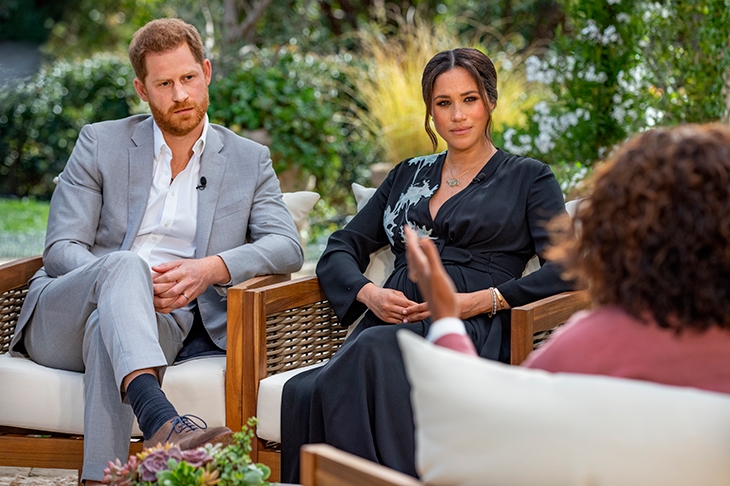Meghan’s adroitness
Sir: Tanya Gold suggests that people criticise Meghan Markle because she is mixed race and a woman, and states it is because she has dared to attack the royal family (‘In defence of Meghan’, 13 March). I think that misses the point. For a great number of people, her narrative simply does not ring true. Over the past few decades, thousands of media articles have accused the royal household of being claustrophobic, pedantic and antiquated. But unlike the young and naive Diana, Meghan was a thirtysomething TV star with agents and PR people when she met Prince Harry. It’s hard to believe she didn’t know what she was letting herself in for.
As Rod Liddle says, Meghan is a subscriber to the current American view that everything is possible as long as you believe it enough. Maybe she thought the force of her personality alone would change what she calls the British establishment. From her recent comments, she now seems to believe that the power of her compassion can change the world. This is what irritates most of her critics and it has nothing to do with her race. Tanya Gold calls it ambition, but it seems more like narcissism, and is very redolent of a previous American divorcée, Wallis Simpson.
People would instinctively want to sympathise with a woman who says she has been depressed and has had a miscarriage, but Meghan’s adroit positioning and use of unspecified accusations is a turn-off. I predict she is eyeing up a career in Democratic party politics.
Jeremy Tyrer
London SW19
Culture clash
Sir: Surely what the Oprah interview (‘Telling tales’ and others, 13 March) represented was nothing more than a head-on collision between the 19th and 21st centuries.
John Cane
Charlton Kings, Gloucestershire
Natural curiosity
Sir: Even before reading Anil Bhoyrul’s thoughtfully constructed article regarding racism in mixed marriages (‘In the mix’, 13 March), I had been pondering what that potent word actually means, and why it might be considered racist to speculate on the skin colour of the progeny of a mixed-race union. Is it sexist to be curious as to the gender of an unborn child? There is surely a massive difference between natural curiosity and blatant discrimination. I grew up in Jamaica, the national motto of which island is: ‘Out of many, one people.’ That is exactly how it should be, without concocting sinister interpretations of mere curiosity.
Nigel Milliner
Treworthal, Cornwall
School geography
Sir: The list of British schools ranked by Oxbridge offers in your informative Schools supplement (13 March) was revealing. Of the 80 schools named, none is Scottish, none Northern Irish and just one (position 74) is located in Wales. If the data is correct, two of our most learned and powerful institutions have seemingly given up on the Union.
Clive Wolfendale
North Wales
Science isn’t everything
Sir: Richard Dawkins’s protest against the tyranny of woke groupthink in universities (Diary, 13 March) is welcome. Why, though, does he remain so dogmatic about religion and other spheres beyond the realm of science? Ways of knowing honed outside the lab ‘may be consoling, they may be sincere’, he writes, ‘but one thing they are not is true’. It’s not just that his account of authentic knowledge is so impoverished. Countless true beliefs — starting with the convictions that torture is wrong and compassion good — cannot be demonstrated in a test tube.
A deeper point is that Dawkins contradicts himself. What is the scientific basis for his own claims about right and wrong paths to knowledge in the first place? This is the quicksand Dawkins’s bestselling diatribes against religion are based on. So no (to answer his final point): the world will not be saved by science alone, but by science allied to our apprehension of goodness, beauty and truth.
Rupert Shortt
St Edmund’s College, Cambridge
Taxing issue
Sir: Often overlooked among the taxes on business, including by Martin Vander Weyer in his Any Other Business article (6 March) is the 13.8 per cent (over a threshold) of employer’s national insurance contributions paid on every employee’s wages. As my Revenue Law lecturer said in his first lecture to us students in the early 1980s, right-of-centre governments keep taxes low and simple; socialist governments keep taxes high and tax law complicated and riddled with lacunae and exemptions. There has not been much evidence of the former approach since a Conservative government was returned to power in 2015.
Tim Page
Trowbridge, Wiltshire
An unusual welcome
Sir: I was not as lucky as Richard Clayton’s colleague whose local ‘fixer’ took his smallpox vaccination for him in Rwanda (Letters, 13 March). On my arrival at Muscat airport in 1970, after administering the required jab, the health officer stated proudly: ‘Now you have cholera!’
John McCarthy
Geneva, Switzerland
How to ride a bike
Sir: Dr Moore (Letters, 13 March) laments his father’s not teaching him to learn to ride a bicycle. It is not too late. Take a bicycle to the top of a small hill. Sit on it with the brakes on and feet on the floor, look ahead, release the brakes gently, roll downhill and, as speed increases, still looking ahead, lift your feet on to the pedals and start riding.
Mark Revelle
Southill, Bedfordshire
Got something to add? Join the discussion and comment below.
Get 10 issues for just $10
Subscribe to The Spectator Australia today for the next 10 magazine issues, plus full online access, for just $10.
You might disagree with half of it, but you’ll enjoy reading all of it. Try your first month for free, then just $2 a week for the remainder of your first year.














Comments
Don't miss out
Join the conversation with other Spectator Australia readers. Subscribe to leave a comment.
SUBSCRIBEAlready a subscriber? Log in